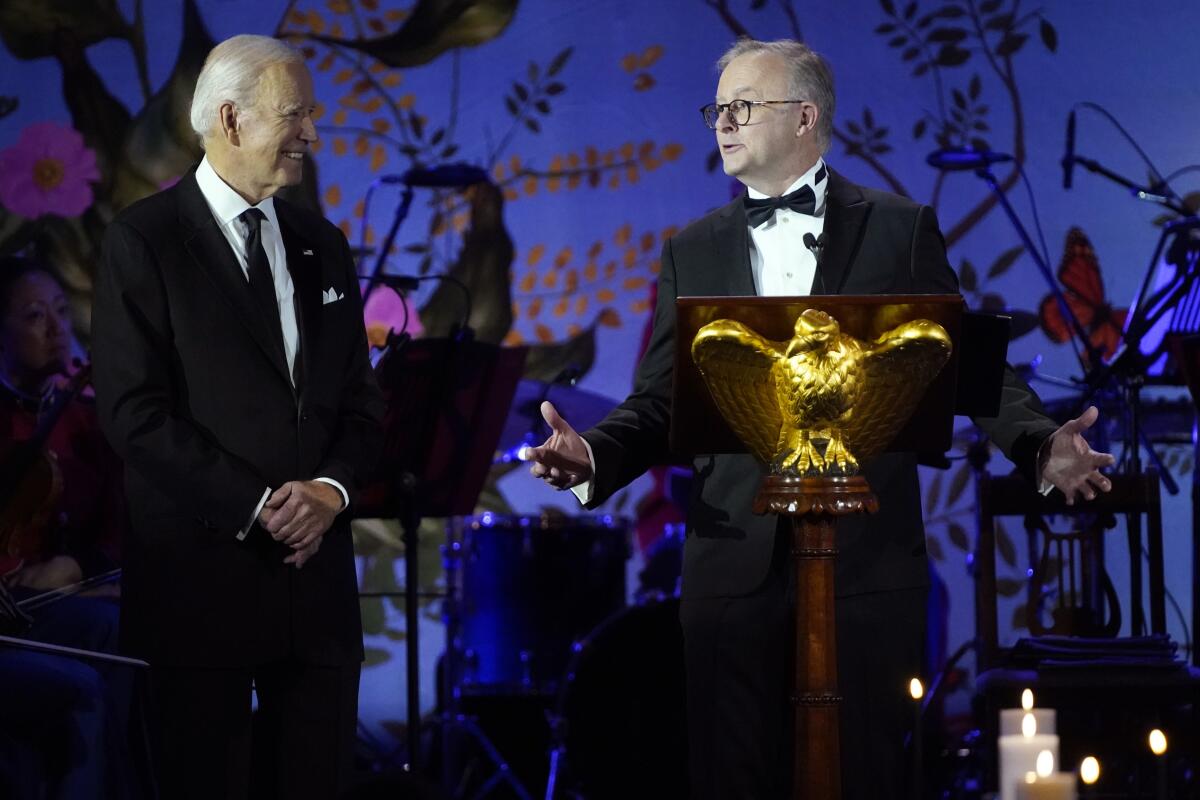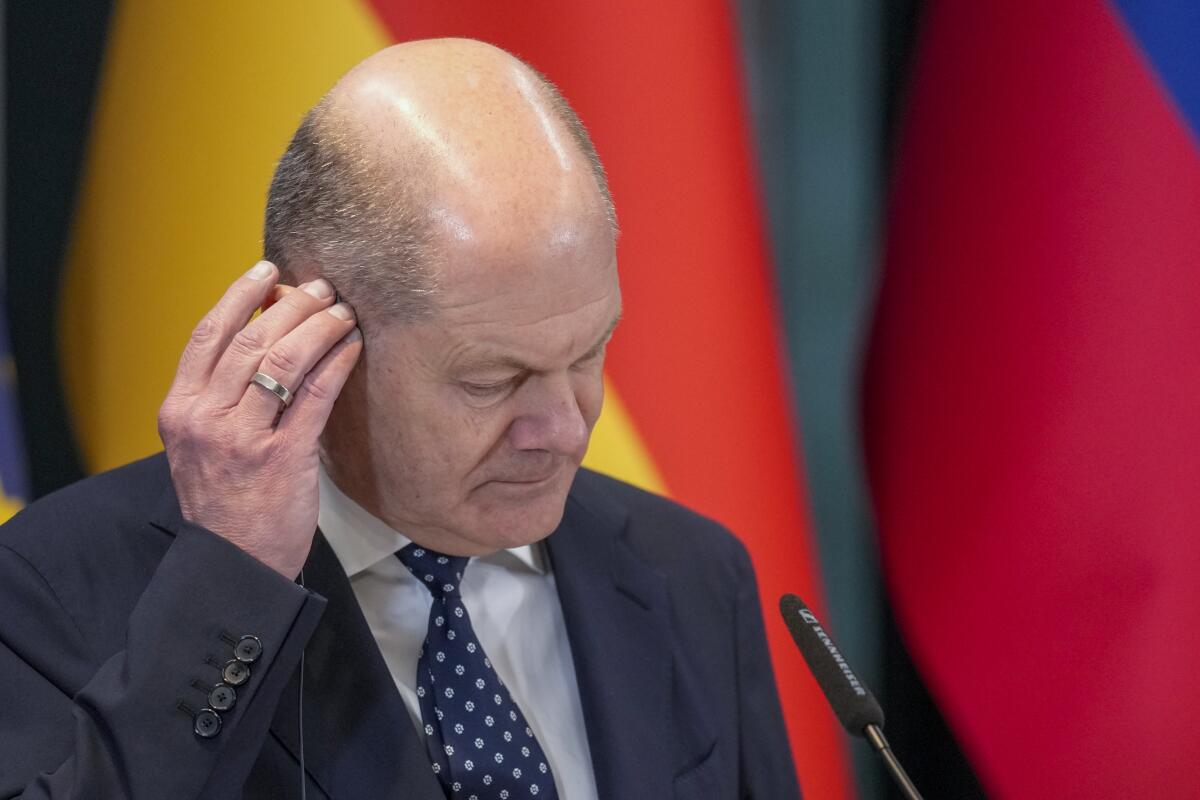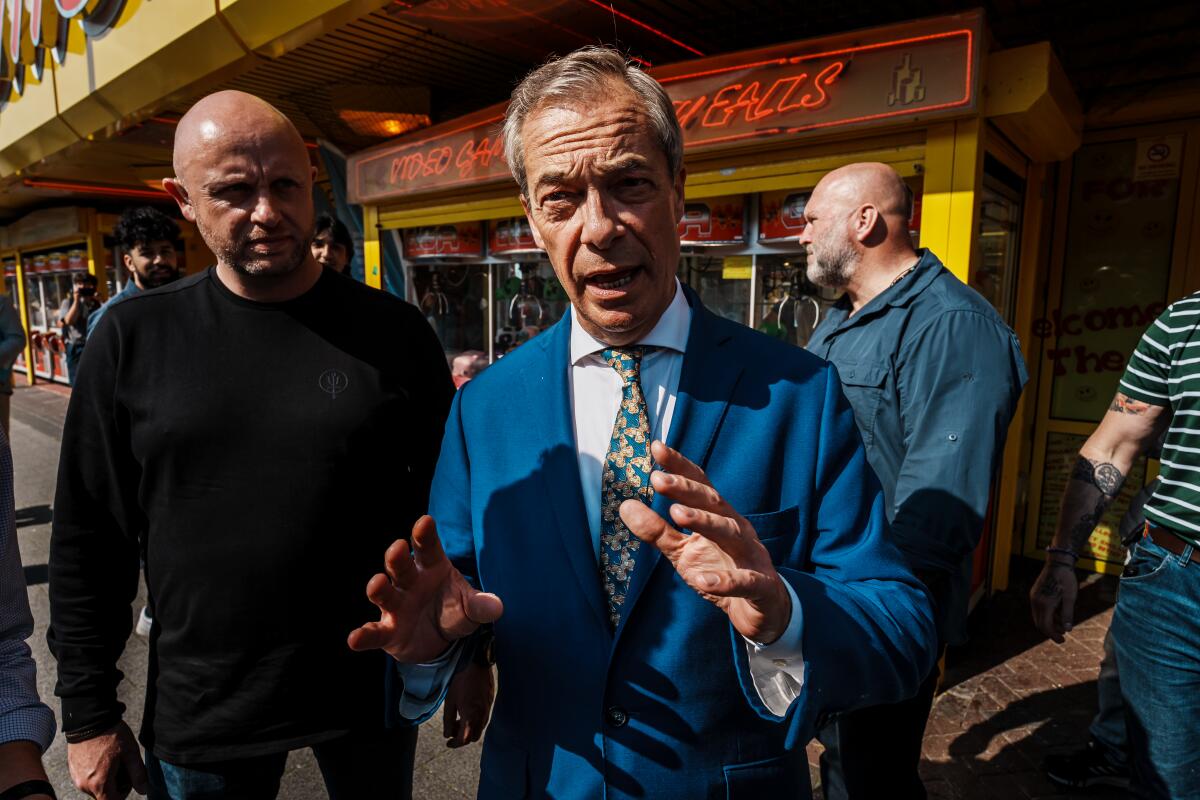From international allies, quiet relief and public praise as Biden quits race

BERLIN — Not so long ago, the leaders of major democracies generally refrained from political commentary of the sort that could be seen as meddling in one another’s domestic affairs.
But the current U.S. presidential campaign has featured so much upheaval that it has been difficult for friends and rivals alike to remain completely on the rhetorical sidelines.
The latest bombshell — President Biden bowing out of the presidential contest — elicited quiet relief among Washington’s closest U.S. allies in Europe, some of whom had been privately fretting over whether Biden’s age and frailty enhanced the prospect of another turn in office for Donald Trump.
Trump’s running mate, J.D. Vance, once said: ‘I don’t really care what happens to Ukraine one way or the other.’
From Europe and beyond, however, the allied outpouring of respect that met Biden’s announcement was carefully calibrated to avoid suggesting that the Democratic incumbent would have faced a potentially humiliating loss had he not withdrawn.
Many emphasized a spirit of political self-sacrifice underpinning the president’s pullback from the race. Australian Prime Minister Anthony Albanese told journalists that Biden deserved recognition for “not putting himself forward first, but giving his first consideration to being what he believes is in the interests of the United States of America, as he has done his whole public life.”

Some leaders, intentionally or not, pushed back against quickly emerging Republican talking points, such as the assertion by some high-profile Trump supporters that if Biden wasn’t up to a campaign, he should not serve out his full White House term, either.
British Prime Minister Keir Starmer, who took office two weeks ago, pointedly noted on X that “I look forward to us working together during the remainder of his presidency.”
In praising the U.S. president’s statesmanship, European leaders tactfully skipped any public reference to what had become a fierce battle among Democrats over whether Biden should bow out. German Chancellor Olaf Sholz, adopting a tone similar to other allied leaders on the continent, lauded “my friend Joe Biden” for his accomplishments.
“His decision not to run again deserves respect,” Sholz wrote on X.

European leaders fear that a second Trump presidency would be excessively transactional — “a quid pro quo style of governing,” as Laura von Daniels, head of the U.S. research division at the German Institute for International and Security Affairs, put it — rather than one reflecting shared values.
“So there is a sense of relief, because it had become more and more obvious that Democrats had diminishing chances of winning the race,” she said.
But Von Daniels added that there is a growing acceptance that regardless of who wins the U.S. election, Europe will need to take more responsibility for its own security.
NATO, meeting in Washington, marks its 75th anniversary this year. But for key members, including the U.S., France and Germany, it’s a turbulent time.
Coincidentally, the president’s withdrawal came hours before European Union foreign ministers gathered Monday in Brussels for a previously planned meeting. The talks had been expected to be dominated by topics such as the Mideast and the war in Ukraine, but offered the top diplomats a chance to confer among themselves about the dramatically recalibrated U.S. presidential contest.
Biden’s withdrawal was likely viewed as a genuine loss by European leaders who see Biden as a “last of the old breed of classic trans-atlanticists,” said Richard Youngs, a senior fellow in the democracy, conflict and governance program at Carnegie Europe.
Trump’s avowed disdain for the NATO alliance rattled European leaders while he was in office, and those fears have grown amid his resurgent candidacy.
But even for those who believe Biden’s move will help Democrats defeat Trump in November, Youngs said, “for Europe this is also an uncertain turning of the page.”

Some of the warmest tributes to Biden came from those for whom U.S. support has literally been a matter of life and death. Ukrainian President Volodymyr Zelensky said that Biden had “supported our country during the most dramatic moment.”
In recent days, world reaction to recent U.S. campaign developments, even the most jolting ones, has largely hewed to a conventional script, such as the virtually universal condemnation in response to the July 13 assassination attempt against Trump.
As in the U.S., global expressions of sympathy and of relief that Trump was not seriously injured came from across the political spectrum, together with admonitions that political violence was never acceptable.
France’s voters denied the far right an expected election victory. But neither the left nor the center won an absolute majority. Deadlock will likely follow.
On the campaign trail, Trump routinely praises autocratic leaders, and after the attempt on his life, some far-right backers outside the U.S. rejoiced at the notion that the assassination bid seemed to have strengthened the former president’s hand.
After the attempt, for example, Geert Wilders, a far-right party leader in the Netherlands, posted a picture of the Republican standard-bearer, bloodied and with a raised fist, labeled simply: “President Trump.”
With the extent of that perceived boost now in question, some of those same figures greeted Biden’s announcement with veiled and not-so-veiled gibes.
Nigel Farage, who won a British parliamentary seat this month as his hard-right anti-immigration Reform UK party garnered about 15% of the nationwide vote, said it scarcely mattered who the Democrats put up as Biden’s replacement.

“Whoever they pick, Trump will win in November,” Farage wrote on X.
Biden endorsed Vice President Kamala Harris, and the party appeared to be coalescing around her.
From Moscow, Foreign Ministry spokeswoman Maria Zakharova mused on the messaging app Telegram about prior “collusion between the American media and political circles to cover up the truth about [Biden’s] mental condition.”
Moscow has made well-documented efforts to influence elections in Europe and the United States, but on Monday, Kremlin spokesman Dmitry Peskov sought to strike a note of world-weary indifference over the state of U.S. politics.
“In recent years, what has been happening in the United States has taught us not to be surprised by anything,” Peskov told journalists. “This topic should concern American voters, but not us.”
Others who have overtly allied themselves with Trump were left in somewhat of an awkward limbo by weeks of uncertainty over whether Biden would heed growing calls to drop out of the race.
News of Biden abandoning his reelection bid came just as Israeli Prime Minister Benjamin Netanyahu was about to set out for what had been forecast to be a contentious visit to Washington when the news came down.

Since the start of Israel’s nine-month-old war with the Palestinian militant group Hamas, Netanyahu has repeatedly clashed with the Biden administration over humanitarian aid to Gaza and measures to protect Palestinian civilians, but analysts say Biden’s standing among young and Arab American voters was nonetheless hurt by his staunch support of Israel.
Even as Netanyahu’s political rivals at home responded to Biden’s withdrawal with heartfelt-seeming thanks for his backing, the prime minister was initially silent — recalling, perhaps, Trump’s longtime grudge against him for offering pro forma congratulations to Biden for winning the 2020 election, the result of which Trump continues to question.
But on Monday, seemingly bowing to political etiquette as he prepared to leave from Tel Aviv’s Ben Gurion airport, Netanyahu said his trip was a chance to thank Biden “for the things he did for the state of Israel, both in the war and during his years of service as a senator, as vice president and as president.”
More to Read
Sign up for Essential California
The most important California stories and recommendations in your inbox every morning.
You may occasionally receive promotional content from the Los Angeles Times.













